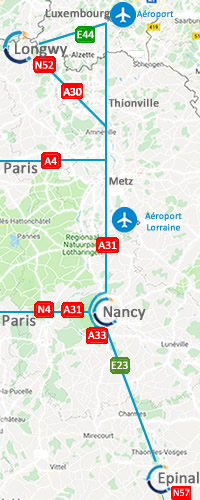CRAN celebrates its 40th anniversary Thursday 15 & Friday 16 October 2020. On this occasion, Didier Wolf, director of CRAN, takes stock of 40 years of research and its prospects.
This year, the University of Lorraine is in 40th position in the Shanghai ranking for automation. How has CRAN contributed to strengthen its position?
Since its creation, CRAN has been pursuing a scientific policy balanced between applied research actions in connection with industry and the study of more fundamental problems, even if many of them are application-based. This balance is attractive both to industry, CRAN contracts with major groups (ArcelorMittal, SAFRAN, Dassault, Airbus, EDF, ...) but also with universities and renowned institutions nationally and internationally. Moreover, young and brilliant researchers wish to come and make a career at CRAN.
This policy explains the quality of its results and the influence of CRAN. Every year, CRAN researchers publish numerous articles in leading journals in the field. A large proportion of CRAN's publications are made with researchers from the best international teams in the discipline. Many CRAN researchers have a high national and international visibility: they organize and participate massively in leading international conferences. They are part of the editorial and program committees of the best forums. This excellence largely explains the very good position of the University of Lorraine in "Automation and control" in the Shanghai ranking. It is a recognition and a pride for the researchers of the laboratory to have participated in this success of the University of Lorraine.
How has CRAN gone beyond the traditional sectors of industry to open up to new disciplines?
Originally, CRAN was interested in systems analysis and control, signal processing and computer engineering applied to technical and industrial systems such as electrical machines or steelmaking processes. However, thanks to the experience acquired and its dynamism, CRAN has developed its research in line with the modernization of equipment and new technologies. Examples include networked systems (computer systems, but more generally interconnected systems of all kinds, and in particular connected objects and IoT), systems where operational safety is a key element (nuclear power for example) or societal systems (study of opinion dynamics).
The evolution of CRAN towards healthcare systems is equally remarkable (diagnosis and care in cancerology and neurology, signal processing and biomedical images). Today, nearly half of CRAN's researchers work in conjunction with the CHU and the ICL in an interdisciplinary approach that combines automation in the broadest sense with biology and medicine. These new fields of investigation have made it possible to broaden and renew both fundamental and applied scientific issues in line with strong societal demand. This has naturally led to an increase in collaborations with new large international teams and partnerships with companies at the cutting edge of new technologies.
What are CRAN's future orientations? What is its long-term ambition?
While maintaining its academic level in "Automation and control" in the broadest sense, CRAN has the ambition to increase its industrial and societal impact. The rise of digital technologies allows the implementation of concepts that were previously difficult to apply because of their complexity. Artificial intelligence is a good example of this, and will gradually become part of the design of automatic tools and methods. The processing of signals/images and more generally medical data will allow in the medium term the implementation of a precision medicine which is characterized by an adaptation of the treatment to the characteristics of the individual (genetics, environment ...), but also by taking into account the high degree of human variability. The techniques developed at CRAN will enable the control and monitoring of interconnected systems (Internet of Things, fleet of land or aircrafts, robots, motor vehicles, etc.). CRAN is very well positioned on these subjects and intends to play an important role in the future.






